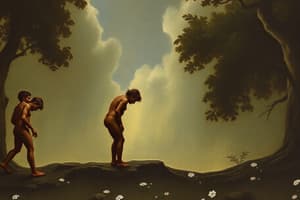Podcast
Questions and Answers
What is biological anthropology?
What is biological anthropology?
- The study of human behavior only
- The study of human biology and behavior, as well as their extinct hominin ancestors and related non-human primates from an evolutionary perspective (correct)
- The study of non-human primates only
- The study of human biology only
What is the common orientation of all branches of biological anthropology?
What is the common orientation of all branches of biological anthropology?
- The study of non-human primates only
- The study of human biology only
- The study of human behavior only
- The study of human biology and behavior, as well as their extinct hominin ancestors and related non-human primates from an evolutionary perspective (correct)
Who is considered the first prominent physical anthropologist?
Who is considered the first prominent physical anthropologist?
- Franz Boas
- Earnest Hooton
- Aleš Hrdlička
- Johann Friedrich Blumenbach (correct)
What did French physical anthropologists focus on in the 19th century?
What did French physical anthropologists focus on in the 19th century?
Who emphasized the influence of culture and experience on the human form in the late 19th century?
Who emphasized the influence of culture and experience on the human form in the late 19th century?
Which two prominent figures promoted theories of racial superiority and a European origin of modern humans?
Which two prominent figures promoted theories of racial superiority and a European origin of modern humans?
What did Sherwood Washburn introduce in 1951?
What did Sherwood Washburn introduce in 1951?
What have advances in the understanding of the molecular structure of DNA and the development of chronological dating methods opened doors to?
What have advances in the understanding of the molecular structure of DNA and the development of chronological dating methods opened doors to?
What are some of the significant contributions that biological anthropology has made?
What are some of the significant contributions that biological anthropology has made?
Flashcards
Biological Anthropology
Biological Anthropology
The scientific study of human biology and behavior, including extinct hominin ancestors and non-human primates, from an evolutionary perspective.
Scala Naturae
Scala Naturae
A system from ancient Greece that placed humans on a scale including everything from inanimate objects to deities.
Johann Friedrich Blumenbach
Johann Friedrich Blumenbach
An early physical anthropologist who divided humankind into five major races.
19th Century Anthropology
19th Century Anthropology
Signup and view all the flashcards
Franz Boas
Franz Boas
Signup and view all the flashcards
Sherwood Washburn
Sherwood Washburn
Signup and view all the flashcards
Advances in Molecular Biology
Advances in Molecular Biology
Signup and view all the flashcards
Focus of Biological Anthroplogy
Focus of Biological Anthroplogy
Signup and view all the flashcards
Study Notes
Biological Anthropology: The Study of Human Biology and Behavior
- Biological anthropology is a scientific discipline that studies the biological and behavioral aspects of human beings, their extinct hominin ancestors, and related non-human primates, particularly from an evolutionary perspective.
- This subfield of anthropology is further divided into several branches, all united in their common orientation and/or application of evolutionary theory to understanding human biology and behavior.
- The origins of biological anthropology date back to ancient Greece, when humans were placed on the scala naturae, a system that included all things from inanimate objects to deities.
- Scientific physical anthropology began in the 17th to 18th centuries with the study of racial classification, and the first prominent physical anthropologist was Johann Friedrich Blumenbach, who argued for the division of humankind into five major races.
- In the 19th century, French physical anthropologists focused on craniometry, while the German tradition emphasized the influence of environment and disease upon the human body.
- In the late 19th century, Franz Boas strongly impacted biological anthropology by emphasizing the influence of culture and experience on the human form.
- However, scientific racism still persisted in biological anthropology, with prominent figures such as Earnest Hooton and Aleš Hrdlička promoting theories of racial superiority and a European origin of modern humans.
- In 1951, Sherwood Washburn introduced a "new physical anthropology" that focused on human evolution, moving away from classification towards evolutionary process.
- Advances in the understanding of the molecular structure of DNA and the development of chronological dating methods opened doors to understanding human variation, both past and present, more accurately and in much greater detail.
- Notable biological anthropologists include Johann Friedrich Blumenbach, Franz Boas, Sherwood Washburn, and Jane Goodall.
- Biological anthropology has made significant contributions to understanding human evolution, genetics, and behavior, as well as addressing issues of race, health, and disease.
- Biological anthropology continues to evolve and expand as new discoveries and technologies emerge, offering new insights into the biological and behavioral aspects of human beings and their closest relatives.
Studying That Suits You
Use AI to generate personalized quizzes and flashcards to suit your learning preferences.




